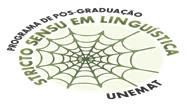Banca de DEFESA: LORENE FERNÁNDEZ DALL NEGRO FERRARI
Uma banca de DEFESA de DOUTORADO foi cadastrada pelo programa.DISCENTE : LORENE FERNÁNDEZ DALL NEGRO FERRARI
DATA : 01/07/2025
HORA: 13:30
LOCAL: google meet
TÍTULO:
THE POWER OF AFFECTS IN TRANSFORMATIVE EXPERIENCES AT THE MOINHO CULTURAL SOUTH AMERICAN INSTITUTE ON THE BRAZIL-BOLIVIA BORDER: TRANSLINGUISTIC EXPERIENCES, PERFORMANCES AND PRACTICES
PALAVRAS-CHAVES:
Construction of Meanings. Affection. Translingual space. Life trajectories.
PÁGINAS: 86
GRANDE ÁREA: Lingüística, Letras e Artes
ÁREA: Lingüística
SUBÁREA: Lingüística Aplicada
RESUMO:
This research, linked to the Stricto Sensu Postgraduate Program in Linguistics - PPGL of the
State University of Mato Grosso - UNEMAT, is enrolled in the area of concentration “Study of
Linguistic Processes” and in the research line “Study of Processes of Social Practices of
Language”, from the perspective of Applied Linguistics. As the objective of this research, I
seek to analyze, in a translingual space, the construction of meanings in the production of
affections, based on the life trajectories of participants of the Instituto Moinho Cultural Sul-
Americano. To this end, as a theoretical framework, I was guided by the studies of
translanguaging (Canagarajah, 2020; Garcia, 2020; Rocha and Maciel, 2015; Wei, 2011) and
the theories of affect Morgan, Rocha and Maciel (2021) and Spinoza (2009). The
methodological bias that guided me consists of a qualitative approach, based on the emerging
postmodern methodology of the studies by Somerville (2007, 2012) and Maciel (2016). I chose
this methodology because it is a more dynamic approach to data analysis, taking into account
three aspects for the quality of emergence: the processes of wondering, becoming, and
generating. In this scenario, emergence enables fluidity, development, and the unexpected in
the search for new knowledge. From this perspective, the data were generated during my visits
to the Instituto Moinho Cultural Sul-Americano in Corumbá-MS. For analysis, I considered the
data generated from multiple instruments: notes in the field diary where I observed everything
I saw and felt, audio and video recordings made on my cell phone, and recordings received
from participants via my WhatsApp. Based on this research, I sought to promote a reflection
on how meanings are constructed and can emerge, considering an embodied and affective
dimension in both theory and practice. I sought to look at the encounters of bodies, at the life
trajectories of the members of Moinho. I sought, based on the emergencies, the translingual and
affective perceptions of life trajectories. This profusion of experiences led to the generation of
new knowledge and feelings not previously considered by me or for this research.
MEMBROS DA BANCA:
Interna - 592.690.301-72 - ROSIMAR REGINA RODRIGUES DE OLIVEIRA - UNIFESSPA
Interno - 638.809.461-91 - RUBERVAL FRANCO MACIEL - UNEMAT
Interna - 132146001 - BARBARA CRISTINA GALLARDO
Externa à Instituição - SUZANA VINICIA MANCILLA BARREDA - UFMS
Externa à Instituição - ROSELI PEIXOTO GRUBERT - UEMS
Externa à Instituição - CLAUDIA HILSDORF ROCHA - UNICAMP
Externo à Instituição - MARCELA DOS SANTOS ABREU - UNESP



